
Last Tango in Paris is a 1972 erotic drama film directed by Bernardo Bertolucci. The film stars Marlon Brando, Maria Schneider and Jean-Pierre Léaud, and portrays a recently widowed American who begins an anonymous sexual relationship with a young Parisian woman.
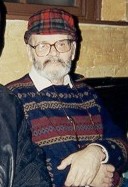
Lucio Fulci was an Italian film director, screenwriter, and actor. Although he worked in a wide array of genres through a career spanning nearly five decades, including comedies and spaghetti Westerns, he garnered an international cult following for his giallo and horror films.

Maria-Hélène Schneider, known professionally as Maria Schneider, was a French actress.

Valentina Cortese, sometimes credited as Valentina Cortesa, was an Italian film and theatre actress. In her 50 years spanning career, she appeared in films of Italian and international directors like Michelangelo Antonioni, Federico Fellini, Franco Zeffirelli, François Truffaut, Terry Gilliam, Joseph L. Mankiewicz and others.

Zombi 2 is a 1979 English-language Italian zombie film directed by Lucio Fulci. It was adapted from an original screenplay by Dardano Sacchetti to serve as a sequel to George A. Romero's Dawn of the Dead (1978), which was released in Italy under the title Zombi. It stars Tisa Farrow, Ian McCulloch, and Richard Johnson, and features a score by frequent Fulci collaborator Fabio Frizzi. Frizzi's score has been released independently of the film, and he has performed it live on tour.
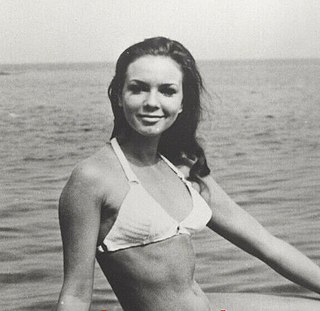
Marie Liljedahl is a Swedish actress who had a short-lived film career in the late-1960s and early-1970s, in the films of Joseph W. Sarno and Jesus Franco.

Hercules Unchained is a 1959 Italian-French epic fantasy feature film starring Steve Reeves and Sylva Koscina in a story about two warring brothers and Hercules' tribulations in the court of Queen Omphale. The film is the sequel to the Reeves vehicle Hercules (1958) and marks Reeves' second – and last – appearance as Hercules. The film's screenplay, loosely based upon various Greek mythology and plays by Aeschylus and Sophocles, was written by Ennio De Concini and Pietro Francisci with Francisci directing and Bruno Vailati and Ferruccio De Martino producing the film.
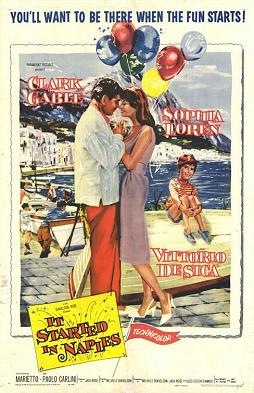
It Started in Naples is a 1960 American romantic comedy film directed by Melville Shavelson and produced by Jack Rose from a screenplay by Suso Cecchi d'Amico, based on the story by Michael Pertwee and Jack Davies. The Technicolor cinematography was directed by Robert Surtees. The film stars Clark Gable, Sophia Loren, Vittorio De Sica and an Italian cast. This was Gable's final film to be released within his lifetime and his last film in color.
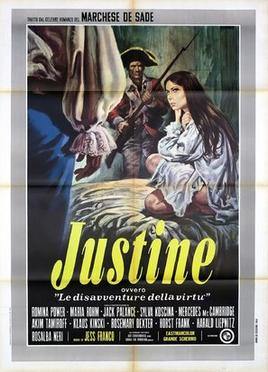
Marquis de Sade: Justine is a 1969 erotic period drama film directed by Jesús Franco, written and produced by Harry Alan Towers, and based on the 1791 novel Justine by the Marquis de Sade. It stars Romina Power as the title character, with Maria Rohm, Klaus Kinski, Akim Tamiroff, Harald Leipnitz, Rosemary Dexter, Horst Frank, Sylva Koscina and Mercedes McCambridge.
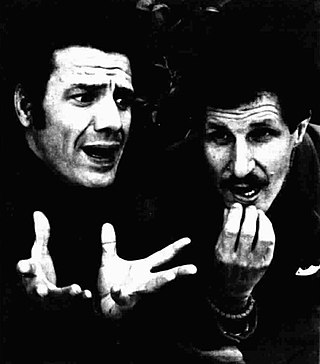
Franco and Ciccio were a comic comedy duo formed by Italian actors Franco Franchi (1928–1992) and Ciccio Ingrassia (1922–2003), particularly popular in the 1960s and 1970s. Their collaboration began in 1954 in the theatre field, and ended with Franchi's death in 1992. The two made their cinema debuts in 1960 with the film Appuntamento a Ischia. They remained active until 1984 when their last film together, Kaos, was shot, although there were some interruptions in 1973 and from 1975 to 1980.
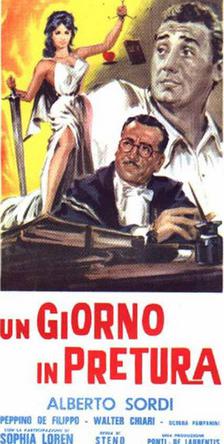
A Day in Court is a 1954 Italian comedy film directed by Steno and starring Peppino De Filippo, Silvana Pampanini, Sophia Loren, and Alberto Sordi. The film is an anthology, consisting of a day's cases before Judge Salomone Lo Russo in a court in Rome.

All the Colors of the Dark is a 1972 giallo film directed by Sergio Martino and starring Edwige Fenech, George Hilton and George Rigaud. The film was also released under the alternate titles Day of the Maniac and They're Coming to Get You!.

Il coltello di ghiaccio is a 1972 giallo film directed by Umberto Lenzi and starring Carroll Baker, Evelyn Stewart, and George Rigaud. Both Baker and Stewart featured in several other films helmed by Lenzi. The film follows a mute woman who finds herself in danger when a serial killer begins stalking the Spanish countryside. The title takes its name from a quote attributed to Edgar Allan Poe, in which he refers to fear as a "knife of ice which penetrates the senses down to the depth of conscience"; the quote, however, was a fabrication by the filmmakers.

Death Laid an Egg is a 1968 giallo film directed by Giulio Questi. Written by Questi and Franco Arcalli, the film stars Ewa Aulin, Gina Lollobrigida and Jean-Louis Trintignant.

Fernando Cicero, better known as Nando Cicero, was an Italian film director, screenwriter and actor.
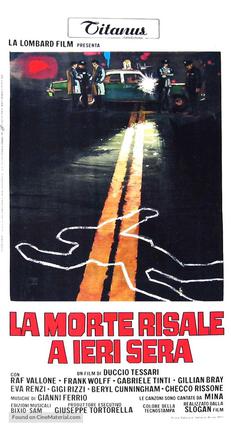
La morte risale a ieri sera is a 1970 crime film directed by Duccio Tessari. The film was written by Tessari and Biagio Proietti and based on the novel I milanesi ammazzano al sabato by Giorgio Scerbanenco.

Il gatto mammone is a 1975 Italian commedia sexy all'italiana directed by Nando Cicero.
Ubaldo Continiello was an Italian composer and conductor.

So Sweet... So Perverse is a 1969 giallo film directed by Umberto Lenzi and written by Ernesto Gastaldi, starring Carroll Baker and Jean-Louis Trintignant. Set in Paris, it tells the story of a wife who plots to get rid of a rich and errant husband but is herself the victim of her accomplices.
Eleven Days, Eleven Nights is a 1987 Italian softcore erotic drama film produced, directed and lensed by Joe D'Amato and starring Jessica Moore, Joshua McDonald, and Mary Sellers set and shot in New Orleans.


















